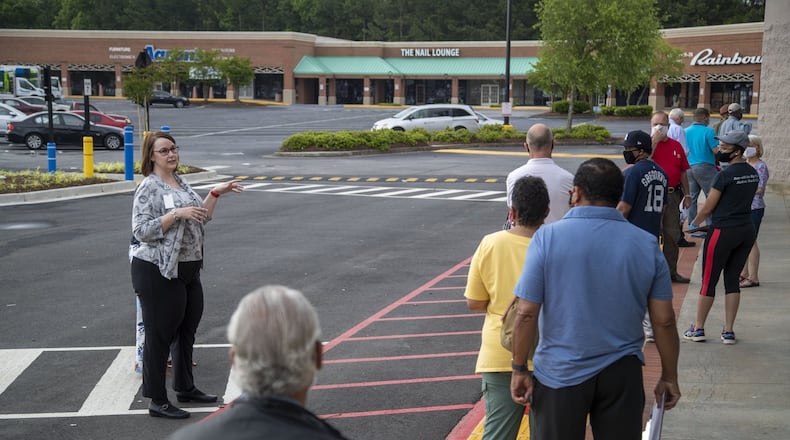A Gwinnett County elections coordinator was fired just before Election Day for errors that caused some precincts to open without polling equipment.
The worker set up machines in numerical order by precinct, Elections Supervisor Kristi Royston said, and not in the order that they needed to be delivered.
That decision caused massive delays in delivering new voting equipment, and as of the morning of June 9, there were 28 locations that did not have all the equipment they were supposed to.
Royston said there were issues throughout the process, including communication problems with delivery drivers and trucks that would not fit as much equipment as was expected, which also caused delays.
But she said the worker's insubordination while voting machines were being tested for logic and accuracy contributed to problems that caused voters at more than a dozen precincts to have to vote by emergency ballot because machines weren't ready.
“Nobody hates this more than me,” Royston said. “We had a really bad situation, but I think we got it together and got it handled in a very good way.”
The county finished its election tallying Tuesday, when a recount in the Democratic primary for chair of the Gwinnett County commission was certified. Curt Thompson, who finished in third place, requested the recount. He was 20 votes behind the second-place finisher, Lee Thompson Jr.
After the recount, the gap narrowed to 13 votes, but Thompson Jr. retained the edge. He was slated to face Nicole Love Hendrickson in the Aug. 11 runoff, but said Thursday he would suspend his campaign and support Hendrickson.
“Hopefully, we’ve learned some lessons,” Thompson Jr. said. “I can’t say I’m happy with the whole process — there were issues with the whole process.”
Those issues included a last-minute lawsuit Tuesday to try to keep the county from certifying the election. Thompson asked for a temporary restraining order, saying the county kept people from observing the recount and did not provide information about rejected absentee ballots. Additionally, open government advocates expressed concern that updated vote totals were provided for Thompson and Thompson Jr., but that they weren’t tallied for the other three candidates in the race.
A judge rejected the request.
Royston said all votes were counted in the race, but it is standard to only report changes in the vote totals of the candidates whose placement in the runoff is in question.
She also said, of the 484 absentee ballots that were rejected for having mismatched signatures, that the number “doesn’t strike me as high” for having received nearly 86,000 absentee ballots. Each of the nearly 500 voters was mailed information about what they had to do to verify their signature, Royston said, and did not do so.
In the 2018 general election, Gwinnett rejected 1,733 absentee ballots. A settlement was reached in March that requires Georgia voters to be quickly notified if their absentee ballot is rejected, after a federal lawsuit was filed last year.
While a judge told Thompson he has the option to challenge the election, Thompson said he does not plan to do so.
“We’re not going to contest it further,” he said. “It’s unfortunate the way the county chose to do the least amount of work possible rather than do it right.”
Royston said the point of a recount isn’t to confirm the exact vote count, but to confirm the outcome.
“The recount happened as prescribed by law,” she said.
About the Author
Keep Reading
The Latest
Featured


